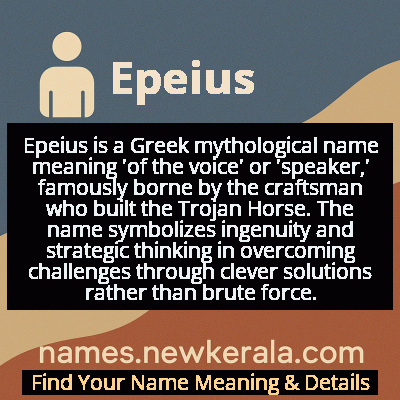Epeius Name Meaning & Details
Origin, Popularity, Numerology Analysis & Name Meaning of Epeius
Discover the origin, meaning, and cultural significance of the name EPEIUS. Delve into its historical roots and explore the lasting impact it has had on communities and traditions.
Name
Epeius
Gender
Male
Origin
Greek
Lucky Number
3
Meaning of the Name - Epeius
Epeius is a Greek mythological name meaning 'of the voice' or 'speaker,' famously borne by the craftsman who built the Trojan Horse. The name symbolizes ingenuity and strategic thinking in overcoming challenges through clever solutions rather than brute force.
Epeius - Complete Numerology Analysis
Your Numerology Number
Based on Pythagorean Numerology System
Ruling Planet
Jupiter
Positive Nature
Optimistic, inspirational, and creative.
Negative Traits
Scattered, exaggerating.
Lucky Colours
Yellow, gold, purple.
Lucky Days
Thursday.
Lucky Stones
Yellow sapphire.
Harmony Numbers
1, 2, 9.
Best Suited Professions
Arts, writing, communication.
What People Like About You
Creativity, optimism.
Famous People Named Epeius
Epeius of Phocis
Mythological Hero and Craftsman
Builder of the Trojan Horse that enabled the Greeks to conquer Troy
Epeius (Boxer)
Athlete
Won the boxing competition at the funeral games of Patroclus, defeating Euryalus
Epeius of Elis
Mythological King
Founder of the city of Pisa and ruler in the Peloponnese region
Name Variations & International Equivalents
Click on blue names to explore their detailed meanings. Gray names with will be available soon.
Cultural & Historical Significance
The cultural impact of Epeius extends to how ancient Greeks viewed the relationship between physical prowess and intellectual achievement. As both a boxer and craftsman, he embodied the ideal of the complete individual—strong in body yet clever in mind. His victory in the funeral games demonstrates his physical capability, while the Trojan Horse showcases his mental ingenuity. This duality reflects the Greek educational ideal of developing both mind and body. In art and literature, Epeius rarely appears as a central figure, but his creation has inspired countless artistic representations, from ancient pottery to Renaissance paintings and modern films, ensuring his cultural relevance endures across millennia.
Extended Personality Analysis
Individuals bearing the name Epeius typically exhibit a remarkable combination of practical intelligence and creative problem-solving abilities. They are natural innovators who approach challenges with both analytical precision and imaginative vision. Like their mythological counterpart, they possess the patience and determination to see complex projects through to completion, often working behind the scenes to achieve significant results. Their strength lies in their ability to devise clever solutions that others might overlook, making them invaluable in situations requiring unconventional thinking. They tend to be meticulous planners who value quality and craftsmanship in all their endeavors, whether professional or personal.
Socially, Epeius-named individuals are often quiet leaders who prefer to let their work speak for itself rather than seeking public recognition. They build trust through reliability and expertise rather than charisma or forceful personality. While they may not be the most outgoing individuals, they form deep, loyal relationships with those who appreciate their unique talents and thoughtful nature. Their combination of physical capability and mental acuity makes them well-rounded individuals who can adapt to various situations. They typically demonstrate resilience in the face of obstacles and possess the strategic thinking to navigate complex social or professional landscapes successfully. Their legacy-oriented mindset means they often create things of lasting value rather than seeking temporary acclaim.
Modern Usage & Popularity
In contemporary times, Epeius remains an exceptionally rare given name, primarily confined to academic circles, classical studies enthusiasts, and families with strong Greek heritage seeking distinctive mythological names. The name has never gained mainstream popularity and is absent from modern baby name registries and databases. Its usage is almost exclusively limited to Greece and among diaspora communities with deep connections to classical traditions. The association with the Trojan Horse gives it a certain intellectual cachet, but its complexity and obscurity prevent widespread adoption. Occasionally, the name appears in historical fiction, literary works, or as a character name in media exploring Greek mythology. In academic contexts, Epeius is more commonly encountered as a subject of study rather than as a personal name. The name's extreme rarity makes it a distinctive choice for parents seeking unique names with profound historical and mythological significance, though its practical usage remains minimal in modern society.
Symbolic & Spiritual Meanings
Epeius symbolizes the transformative power of ingenuity and specialized knowledge in overcoming seemingly impossible challenges. The name represents the archetype of the master craftsman whose unique skills prove decisive in critical moments, embodying the principle that intelligence and creativity can triumph where brute force fails. Like the Trojan Horse he created, Epeius symbolizes hidden potential and strategic deception—the ability to conceal strength within apparent weakness. The name carries connotations of patience, meticulous planning, and the quiet confidence of someone who knows their specialized abilities will ultimately prevail. It represents the intersection of art and strategy, where creative vision combines with practical execution to produce remarkable, game-changing results. Epeius also symbolizes divine inspiration in human achievement, as mythological tradition holds that Athena guided his hands in creating the wooden horse, suggesting that exceptional human accomplishment often requires supernatural assistance or inspiration.

